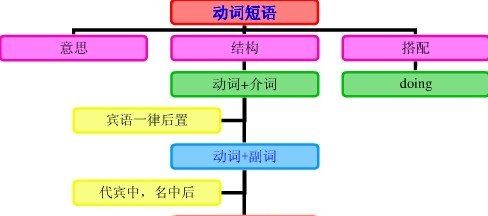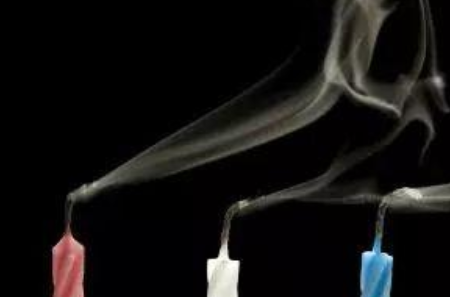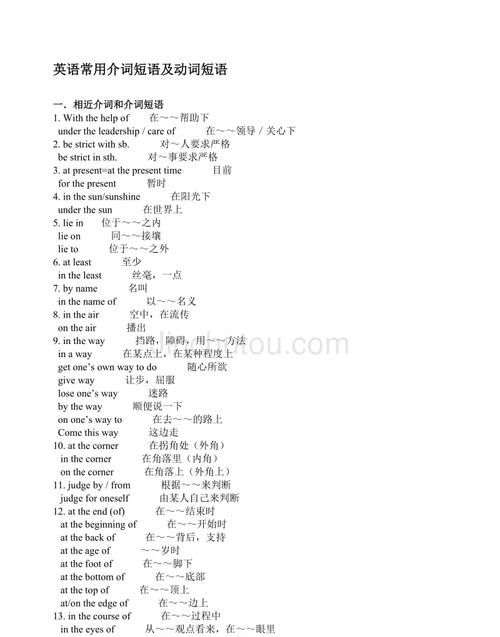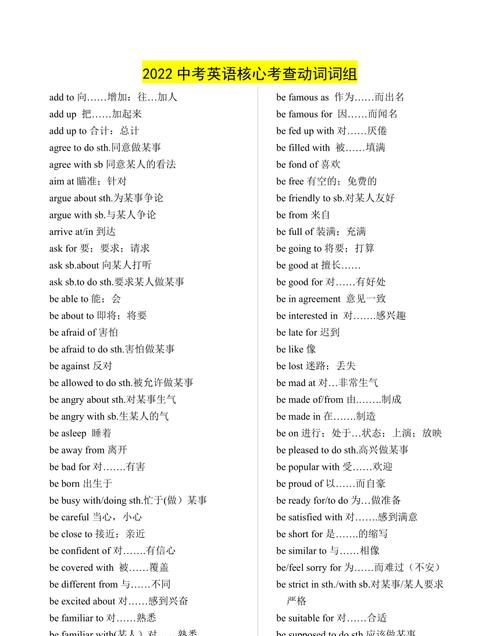本文目录
动词短语造句子带翻译
1.get along with 进展,过日子,与……相处
2. get away 逃走
3. get back 取回,回来
4. get into 进入,陷入
5. get off 从……下来,下车
6. get on (well) with 与……相处融洽
7. get over 克服,从……恢复过来
8. get to know 认识
9. get to 到达
10. get together 相聚
11. get up 起床
12. (get) close to 接近
13. get through 通过,接通(电话)
14. get married 结婚
15. get rid of 处理,去掉
16. come up走过来
17. cut away 切掉,剪掉
18. cut down 砍倒,缩减
19. cut off 切断
20.cut up 切碎

扩展资料
有些短语动词相当于及物动词,有些则相当于不及物动词。英语中一些常用动词常可以与某些介词、副词或其他词构成意义不同的习语(idioms)。
有些动词,既可作及物动词,也可作不及物动词,但用作“及物动词”是一种意思,而用作“不及物动词+介词”是另一种意思。例如:
She will answer for his safety.她要为她的安全负责。
参考资料:动词短语_百度百科
六年级上册英语动词短语有哪些
英语动词短语有如下:
1、shot put:铅球;推铅球;掷铅球;球裁判。
2、put option:看跌期权;认沽期权;出售;卖出期权。
3、put up with:忍受;容忍;忍耐;受苦。
4、put down:记下;放下;杀死。
5、put out:熄灭;关;扑灭;出版。

6、put aside:储存;暂不考虑;保留。
7、put up:建造;举起;张贴;挂起。
8、put on:增加;戴上;上演;教唆。
9、put forward:提出;放出;拨快;呈上。
给你的英语词组
望采纳 谢谢
1. 以break为中心的词组
break away from 脱离,逃离
break down 破坏,粉碎;瓦解;出故障,抛锚
break in 闯进,打断;使顺服
break into 闯入;强行进入;突然开始
break out 爆发,发生;准备使用;起锚
break the law 违反法律
break the record 破记录
break one’s promise 失言
break up 开垦,破碎;解散,分开,分解
2. 以catch为中心的词组
be caught doing 被发现做某事
be caught in the rain 淋雨
catch a bus/train 赶汽车/火车
catch a cold 伤风,感冒
catch one’s word 听懂某人的话
catch sight of 发现,瞥见
catch up with 赶上,追及,追上
3. 以come为中心的词组
come across 偶尔发现,想起;越过;偿付
come along 一道来,陪伴;进步,进展;出现
come at 达到,求得,得到;扑向,袭击
come back 回来;恢复,复原
come down 倒下;降落;跌落;病倒
come from 来自,起源于,从~~产生,生于
come in 进来,进入;流行起来;获名次
come into being 发生,产生,出现,形成
come into power 开始执政,当权,当选
come into use 开始使用,获得应用
come on 上演;开始;赶快;发展;登台;(问题)被提出
come out 出来,传出;出版;结果是;褪色;(秘密)泄露
come to 苏醒,复原;共计;达到;归结于
come to an end 终止,结束
come to know 开始了解到
come true 实现,成为现实;证实
come up 走近;上楼;长出,发芽
4. 以do为中心的词组
be done in 精疲力竭
be done with 完全结束
do a good deed 做一件好事
do away with 去掉,废除;弄死;浪费
do good to (=do sb. good) 有益于
do harm to (=do sb. good) 有害于
do its work 有效,有作用
do much 极有用
do wrong to 做错
do one’s best 尽某人最大努力
do one’s homework 做作业
do one’s utmost 尽力而为
do proud 足以使~~骄傲
do sb. justice 公平对待某人
do some cleaning (V+ing,etc.) 搞卫生
do sb. a favor 帮助某人
do well in 学得不错,干得漂亮
do with 和~~相处,忍受,处理
do without 不需要,不用
do wonders 创造奇迹
have much to do with 和~~很有关系
have nothing to do with 与~~无关
have something to do with 和~~有关
in doing so=in so doing 这时,在这种情况下
That will do. 行了;够了
5. 以get为中心的词组
get about 徘徊,走动,旅行;流传
get above oneself 自视高傲
get accustomed to 习惯于,对~~习以为常
get across 度过,通过,横过;说服,使理解
get ahead of 胜过,超过
get along 前进,进步;同意;离去
get along with 与~~相处
get at 发现,了解;掌握;攻击
get away 离开,逃脱
get back 取回,回来;报复
get behind 落后;识破
get down 咽下;写下;使沮丧,使抑郁
get down to 认真对待,静下心来
get familiar with 熟悉
get hold of 获得,取得
get home 到家
get in 进入,陷入;牵涉
get off 送走;脱下(衣服);下车;动身
get on 上车;穿上;进步,使前进;成功;相处
get upon with 进步;在~~方面获得成功
get one’s hand in 熟悉;习惯
get out of 由~~出来,从~~得出;避免;退休
get over 越过;恢复,痊愈;克服;完成
get ready for 为~~作准备
get rid of 除去,去掉;免除,摆脱
get through 到达,完成,通过;及格
get together 积聚,积累;商谈,取得一致意见
get up 起床,起立;研究,钻研;致力于;安排,组织
get used to 习惯于
have got to do 不得不,必须
6. 以give为中心的词组
be given to 沉溺于,癖好
give about 分配;传播
give and take 相互迁就
give away 赠送;牺牲;泄露;颁发
give back 归还
give cause 给予~~的理由
give ear to 侧耳倾听
give forth 发出,放出;发表
give in 屈服,让步,投降
give in to 同意,接受;向~~让步
give off 发出(烟,气味)
give oneself out to be/as 自称为
give oneself up to 专心于;向~~自首
give out 分发,公布
give place to 让位于,被~~所替代
give rise to 引起,导致;使~~发生
give sb. to understand 通知某人
give up 放弃;停止
give way to 让步,退却;屈服于
7. 以look为中心的词组
look about 四下环顾;查看
look after 照顾,看管
look around 东张西望
look at 注视,着眼于
look back 回顾
look for 寻找;期待,期望
look down on 俯视;轻视
look forward to 盼望,期待
look into 窥视;调查;浏览
look like 看起来象
look on 旁观;面向
look out 向外看;注意;当心,堤防
look over 从上面看过去;检查
look through 透过~~看去;看穿;浏览
look up to 仰望,尊敬
8. 以make为中心的词组
be made from 由~~原料制成
be made of 由~~材料制成
be made up of 由~~组成
make a fool of 愚弄,欺骗
make a mistake 弄错
make a point of doing 强调;认为~~重要;决心,坚持
make advantages/use of 使用,利用
make after 追求,追赶
make believe 假装
make certain 确信,把~~弄清楚
make contact with 接通,与~~接触,与~~联系
make for 去向,向~~前进;有利于
make friends with 和~~交友
make into 把~~制成,使~~转变为
make much of 重视;理解;赏识
make one’s mind on sth. 决定某事
make one’s own 当作自己的看待
make oneself at home 随便,别拘束
make out 填写;开支票;理解;辨认
make the best of 尽量利用;极为重视
make up 弥补,修理;赔偿,补偿;起草;编造;化装
make up to 接近,巴结;向~~求爱
make way for 为~~让路,让路于
on the make 急求成功;增加
9. 以put为中心的词组
put aside 把~~放在一边;搁置;排除
put away 把~~放好,把~~收拾;储藏;吃喝,吃掉
put back 把~~放回原处;驳回
put down 放下;镇压;制止;记下;削减;降落
put forward 提出;拨快;建议,推荐;提倡,倡议
put ~~ into 把~~放入;插入;翻译成
put off 推迟,延期;消除;推脱,推辞
put on 上演;穿上,带上
put one’s heart into 全神贯注,专心致志
put up 举起,挂起;提名,推荐;陈列
put up with 忍受,容忍
10. 以take为中心的词组
be taken aback 吃惊
take a seat 就坐
take a shower 淋浴,洗澡
take aim 瞄准,设立目标
take away 拿走,减去;夺去
take ~~ by surprise 出奇制胜
take care of 当心,注意;照顾;提防;谨慎;处理,对付;负责
take ~~ for 把~~当作
take off 脱去,除去;离开;起飞;模仿;起程;致死;复制,作副本;减弱
take office 就职,上任
take one’s place 就坐,入坐
take one’s temperature 量体温
take part in 参与,参加
take place = happen 发生,举行
take the place of 代替
take pride in 以~~为荣,对~~骄傲
take sb. by the arm 拉某人的胳膊
take it easy 别着急,慢慢来
11. 以turn为中心的词组
give a new turn to 对~~予以新的看法
in one’s turn 轮到某人做某事
out of turn 不按次序的,不合适宜的
take one’s turn to do 轮到做
turn a blind eye to 对~~视而不见
turn against 背叛,采取敌对态度
turn back 折回,往回走
turn down 折叠,翻下,驳回,拒绝考虑
turn into 走进;变成,变为
turn to ~~for help 求助于
turn off 关上(自来水,电器开关);解雇,辞退;避开(问题);制造;生产
turn on 打开(自来水,电器开关);反对;依靠,依赖,取决于
turn one’s attention to 把注意力转向
turn out 培养;证明是;制成;实际情况是
turn out to be 原来是,证明是,结果是
turn over a new leaf 翻开新的一页,重新开始,改过自新
turn (a)round 旋转,转过身来;改变意见;采取新政策
turn to 变成;着手于
turn upside down 颠倒过来,翻过来;使陷入混乱
参考资料: 青年人外语考试网

常用的英语动词短语有翻译的有多少
1.be known as/be famous as作为……而闻名
be known for因……而出名
be known to为……所知
be known by凭……而知
The hill is known for the temple.
LuXun is known to us as a writer.
One can be known by his words and deeds.
2.be married to与……结婚
She is married to a musician. ..
3.be tired of/with对……厌烦
He is tired of/with this kind of life.
=He is bored with this kind of life.
4.be terrified at被……吓一跳
He is terrified at the snake.
5.be burdened with负重
He is burdened with a heavy load.
6.be crowded with挤满
The shop is crowded with people.
7.be dressed in穿着
She is dressed in red.
8.be experienced in对……有经验
He is experienced in mending bikes.
9.be equipped with装备
They are equipped with guns and food.
10.be furnished with提供,布置
They are furnished with enough food.
11.be engaged in sth从事,忙于(=be busy with sth)
He has been engaged in writing novels.
12.be engaged to与……订婚
My daughter is engaged to a nice doctor.
13.be about to do sth.正要做……
I was just about to go swimming when our guide saw me and stopped me.
14.be fit to do/be fit for胜任;适合于
He is fit to do the work.
These books are not fit for children.
15.be worth doing值得做……
The film is worth seeing again.
16.be proud of以……而自影骄傲
I am proud of being a Chinese.
17.be used to sth./doing sth.习惯于……
My grandpa is not used to living in the noisy city
18.be content to do sth./with… 甘愿于干……;满足于……
I am content with your work this time.
19.be content with对……感到满意
You should be content with what you have
20.be up to应由……,轮到……
It's up to her to answer the question.
21.be meant/intended for打算给,打算用作
Is this valuable painting meant for me?
22.be connected with与……有联系
He was also connected with the government.
23.be crazy about对……狂热
Many young people are crazy about Hip-Hop.二、动词break构成的短语动词
1.break out爆发
The Anti—Japanese War broke out in 1937.
2.break in打断;闯入
Two robbers broke in and robbed the bank of a lot of money.
3.break into闯入;破门而入
They broke into the uncle’s bedroom and found the man lying on the floor。dead.
4.break away from脱离
Lincoln said it was not fight for the south to break away from the union.
5.break down(机器,车辆)坏了;失败了;摧毁;分解
We are sorry to arrive late.but the car broke down.
6.break through突破
The marchers broke through the line of the police.
7.break off折断;中断;断绝
Let’s break off for half an hour and have some tea.
8.break up驱散,拆散
The police broke up the crowd.三、动词carry构成的短语动词
1.carry on进行
He had learned enough English to carry on a conversation
2.carry out执行;进行
They were carrying out an important experiment.
3.carry away拿走
Please carry these desks away.
4.carry off夺走,抢走
Some unknown man carried off the prize四、动词call构成的短语动词
1.call on拜访某人,号召
We will call on Mr.Li tomorrow.
We are called on to help those in trouble.
2.call at拜访某地
I called at your office yesterday, but you were not in
3.call for需要;要求;邀约(人);取(物)
Success called for hard work.
call for a doctor去请医生
4.call in 请来;收回
Mother is badly i11.so call in a doctor at once.
5.call up打电话;征召;回想起
I called Tom up and told him the news.
In most countries men are called up at the age of 18.
As I grew up in a small town at the foot of a mountain, the visit to the village called up scenes of my childhood.
五、动词catch,hold构成的短语动词
1.catch/take/get hold of sth.抓住某物
Catch/Get/Take hold of the rope.and I'll pull you up.
2.catch up with赶上
Work hard and I gin sure you are able to catch up with others in class.
3.catch fire着火;烧着
Last night a big building caught fire.
4.catch sight of发现;看到
When the mice caught sight of the cat,the mice run away as quickly as possible.
5.hold up举起;阻滞(交通等);耽搁
He held up one of his fingers and showed it to the class.
In the rush hour the traffic is hold up.,.
6.hold back阻止;控制
We must hold them back from fighting.
7.hold one’s breath憋住气,屏息
How long can you hold your breath under water?
8 hold out坚持;拿出
We must hold out until help comes.
六、动词come构成的短语动词
1.come into…进入……状态
come into being(事物、局面等)产生;形成
The custom came into being long long ago.
2.come along过来;快点
Come along! It’s nearly eight o'clock.
3.come out出来;出版
How did the printing come out?
4.come true实现
I am sure your dream will come true one day.
5.come back to life苏醒过来
When the wounded soldier came back to life,he found himself in hospital.
6.come to the point说到要点,触及问题实质
7.come about发生,造成
The event came about as he had predicted it.
8.come across碰见
You’re the most beautiful woman I've ever come across.
同义词组:run across
I came across an old friend in the street.
9.come to all end结束
Your duties here have come to an end.
10.come to light为人所知,显露
The robbery didn’t come to light until the next day
11.come up with提出,想出
He came up with a new suggestion七、动词do构成的短语动词
1.do well in在某方面做得好
My cousin is a sailor and he is doing very well in the navy
2.do good to对……有好处
Doing morning exercises will do good to your health.
3.do harm to对……有害处
Too much noise does harm to our health.
4.do with处理
What did you do with our goods?
5.do sb.a favour帮某人的忙
Will you do me a favour to carry it upstairs?
6.do up系纽扣;梳理
Look,your bottom isn’t done up.
do up one’s hair梳理头发
八、动词get构成的短语动词
1.get in touch with同……取得联系
2.get up起床
He gets up very early every day.
3.get back回来;取回
1 will get back next weekend.
4.get on上车
You shouldn’t get on the bus until it has stopped completely
5.get over克服;度过
You’ll soon get over these difficulties.
6.get off下车
The bus stopped and the passengers got off.
7.Get together相聚
We should go to a restaurant to get together.
8.get on/along well with与……相处融洽
I am getting on well with my classmates.
9.get into进人;陷入
Don’t get into the habit of smoking.
10.get into trouble陷入麻烦
11.get in a word插话
12.get rid of除掉
We aye doing our best to get rid of pollution.
13.get through通过;接通;完成;经历
I tried to telephone you but I couldn’t get through.
1 will be with you as soon as I get through this work
14.get to到达
He had to get to the other side of street to attend a meeting
15.get about/around/round传开,传出去
The news of the disaster soon get about.
16.get across使理解
The teacher tried to explain the problem,but the explanation did not get across to the class.
17.get away离开
1 was in a meeting and couldn’t get away.
18.get down to(doing)sth.安心做,开始认真干
You must get down to your studies this year.九、动词give构成的短语动词
1.give up放弃
I persuaded him to give up the foolish plan.
2.give in屈服;投降
He wouldn’t give in to the enemy.
3.give out用完;耗尽
Our food and water will give out soon.
4.get out of从……出来,摆脱,
He got out of debt.
5.give away分发;捐赠;泄露
He gave away most of his fortune to the poor work
Please don’t give my secret away.
6.give off放出
This engine gives off lots of smoke and steam
7.give back归还;恢复
Living here has given me back my health.十、动词go构成的短语动词
1.go ahead继续;干吧
He went ahead with the work and got it done.
一May I use your phone?
---Certainly.Go ahead.
2.go by(时间)过去;经过(地点)
Don’t let the good chance go by.
3.go out(灯、火)熄灭
When they arrived,the fire had gone out.
4.go on(doing)继续做某事
Please go on with your work.
5.go on to do sth.接着做另外的事
He went on to watch TV after he had finished his home一
6.go over检查;复习
When I came into the teacher's room,our teacher is going over our homework.
7.go through完成;通过;经历;仔细检察
During the night the computers go through the information.
She went through one hardship after another.
Mother went through the drawer looking for the sweater.
I've gone through too much money this week.
8.go all out(=try/do one’s best)竭尽全力
They went all out to build the dam.
9.go about开始着手,到处走动,传开
How does one go about getting the information.
10.go against违背
They are going against our wishes.
11.go back回家,追溯
This festival goes back to Roman times.
12.go for运用于,应用于’
The medicine went for nothing.
13.go in for参加,爱好
She went in for a singing competition.
14.go with相配
I want some shoes to go with these trousers.
15.go without不吃/喝/用
The poor boy often has to go without supper.
16.go beyond超过
That’s going beyond a joke.
17.go up上升,上涨
The goods have gone up in quality.
18.go down下降,降沉,下沉
The moon has gone down.

以上就是关于英语动词词组20个,动词短语造句子带翻译的全部内容,以及英语动词词组20个 的相关内容,希望能够帮到您。

